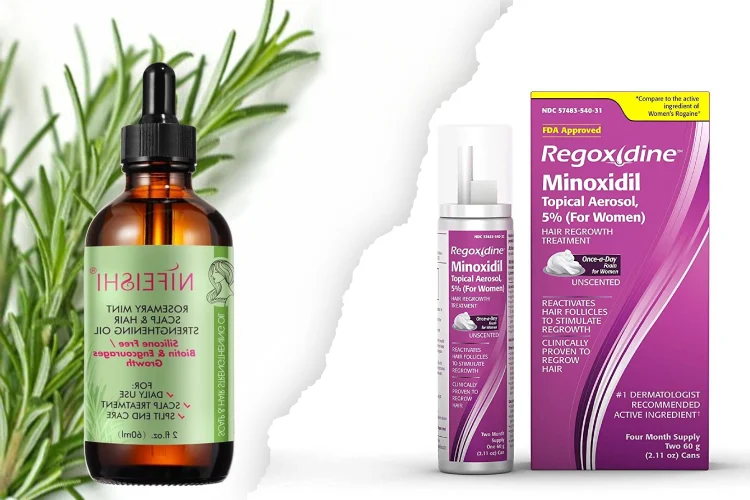
If you’re trying to decide between rosemary oil vs minoxidil for hair growth in 2025, it’s crucial to understand the effectiveness of each. While minoxidil remains the clinically validated and FDA-approved option for promoting hair regrowth, rosemary oil has gained popularity as a natural alternative. However, its scientific backing is less robust, making it an adjunctive remedy rather than a definitive solution.
Choosing the right treatment depends on your personal goals and your tolerance for potential side effects. Minoxidil can provide quicker, more reliable results, but some users experience scalp irritation. In contrast, rosemary oil is more gentle, although its effects tend to be more gradual and require patience to see substantial improvement.
Here’s an in-depth look at both treatments, including their efficacy, mechanisms of action, and safety profiles.
Table of Contents
Comparing Rosemary Oil vs Minoxidil for Hair Growth
Understanding how each treatment works is crucial to making an informed decision. Let’s explore the clinical studies, the effectiveness of each, and how they compare in terms of ease of use and side effects.
Mechanisms of Action
Rosemary oil works primarily by enhancing scalp circulation and reducing inflammation. Its active compounds, like carnosic acid, help stimulate hair follicles and prevent the progressive thinning of hair. Additionally, rosemary oil contains antioxidant properties that mitigate oxidative stress, which can damage cells.
Minoxidil, on the other hand, is a potent vasodilator that directly stimulates hair follicles by increasing blood flow to the scalp. It opens potassium channels in cells, prolonging the anagen phase of the hair cycle and leading to faster and more consistent hair regrowth.
Efficacy in Clinical Studies
Clinical trials consistently show that minoxidil delivers quantifiable, consistent results in users suffering from androgenetic alopecia. Studies report that 40-60% of users experience noteworthy hair regrowth within 3 to 6 months. Its FDA approval is based on extensive research, making it the most established treatment for hair loss.
Rosemary oil, however, has fewer large-scale, controlled studies. A 2020 trial showed that rosemary oil performed comparably to 2% minoxidil in promoting hair regrowth over six months. However, scientific evidence supporting rosemary oil’s efficacy remains limited and less robust than minoxidil’s.
Ease of Use and Application
Rosemary oil is typically applied directly to the scalp, often mixed with carrier oils. Consistency is key, and users must apply the oil daily or several times a week, which some find time-consuming. The natural scent of rosemary oil can be pleasant, though strong depending on the concentration.
Minoxidil is available in both foam and liquid forms and is applied twice daily. It dries quickly and is convenient, but some users experience scalp irritation or unwanted hair growth in other areas. Its standardized dosage makes it an efficient solution for those who prefer a simple, no-mix application.
Safety Profiles and Potential Side Effects
Both rosemary oil and minoxidil have distinct safety profiles. Understanding the potential side effects of each can help you make a more informed decision.
Common Side Effects
Minoxidil often causes scalp irritation, dryness, and itching in up to 20% of users. Some individuals may experience initial shedding before seeing results, while others report rare side effects, including dizziness or rapid heartbeat.
Rosemary oil’s side effects are generally milder, including scalp redness, itching, or a mild burning sensation. Unlike minoxidil, rosemary oil rarely causes systemic side effects due to its minimal absorption.
| Side Effect | Minoxidil Frequency | Rosemary Oil Frequency |
|---|---|---|
| Scalp irritation | Common | Less common |
| Itching | Common | Less common |
| Initial shedding | Sometimes | Rare |
| Allergic reaction | Rare | Rare |
| Systemic effects | Rare | Very rare |
Long-Term Safety Considerations
Minoxidil’s long-term safety is well-documented, but its continuous use is essential to maintain results. Stopping treatment usually leads to a rapid return of hair loss. Some users may experience persistent irritation or dryness.
Rosemary oil has fewer long-term studies, but traditional use suggests it is safe when diluted correctly. Overuse or using undiluted essential oil can cause irritation or sensitization. It’s essential to monitor your scalp condition to avoid cumulative irritation.
Who Should Choose Rosemary Oil or Minoxidil?
The best choice between rosemary oil and minoxidil depends on your hair loss type, skin sensitivity, and overall health condition. Here’s who benefits most from each treatment.
Ideal Candidates for Each Treatment
If you’re looking for a natural alternative and have mild to moderate hair thinning, rosemary oil might be ideal for you. It’s particularly suitable for individuals with sensitive skin or those who experience side effects from chemical treatments. Be prepared for gradual results that may take several months to become noticeable.
Minoxidil is recommended for those with androgenetic alopecia or more significant hair loss. It is effective for both men and women in the early to moderate stages of hair thinning. However, it’s crucial to stay consistent with the treatment to see visible results and be aware of potential side effects.
Scientific Evidence and 2025 Research Trends
As we move into 2025, the latest clinical studies offer clearer insights into the effectiveness of rosemary oil and minoxidil.
Recent Studies and Reviews
Minoxidil remains the gold standard for hair regrowth, with numerous studies showing its ability to increase hair density and stimulate scalp circulation. It is the only FDA-approved treatment for hair loss with consistent results across large populations.
Research on rosemary oil, however, shows promising results in smaller trials. Some studies suggest its anti-inflammatory and antioxidant properties may improve scalp health and stimulate hair follicles. However, its evidence remains limited compared to the extensive research backing minoxidil.
Expert and Dermatologist Perspectives
Most dermatologists recommend minoxidil as the first-line treatment for androgenetic alopecia due to its proven efficacy. They typically advise that any side effects, such as dryness or itching, are outweighed by the benefits.
Rosemary oil is often considered a viable complementary treatment, especially for individuals who prefer natural remedies or cannot tolerate minoxidil. However, dermatologists caution that the consistency of rosemary oil’s results is less predictable due to a lack of standardization in dosage and formulation.
Making an Informed Decision in 2025
When choosing between rosemary oil vs minoxidil, your decision should be based on your specific needs, hair loss type, and tolerance for side effects.
Minoxidil is FDA-approved and highly effective for treating androgenetic alopecia. It can show results within 3-6 months but requires consistent application and may cause some irritation.
Rosemary oil, while lacking the extensive clinical evidence of minoxidil, is a gentle, natural alternative. It may be ideal for those who prefer natural treatments and have sensitive skin.
In conclusion, consider the following factors:
- Effectiveness: Minoxidil has proven, reliable results.
- Side Effects: Rosemary oil has fewer side effects.
- Application: Minoxidil requires twice-daily application, while rosemary oil is more flexible.
- Cost: Rosemary oil is typically more affordable, though quality can vary.
Ultimately, your personal preferences and medical history will guide your choice. Always consult a healthcare provider to determine the best treatment for your hair regrowth needs.
Rosemary Oil (Natural Option)
Looking for a gentle, natural solution to thinning hair?
Try Rosemary Oil, known for boosting scalp circulation and promoting hair regrowth—without harsh chemicals.
👉 Check it out on Amazon
Minoxidil (Clinically Proven Treatment)
Want faster, clinically backed hair regrowth?
Discover the power of Minoxidil—the #1 dermatologist-recommended treatment for hair loss.
👉 Shop Minoxidil on Amazon
